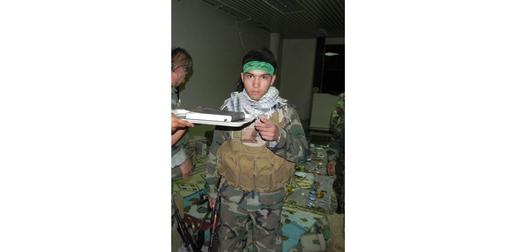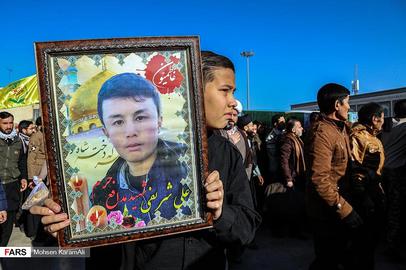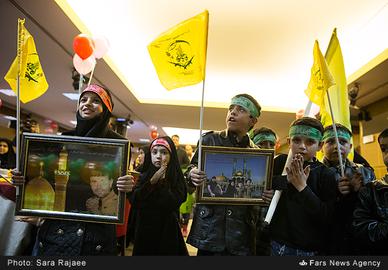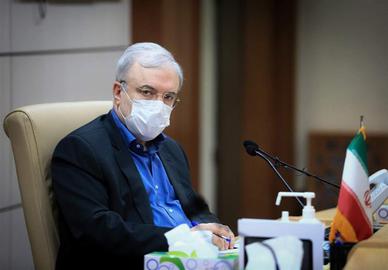This article was written by a citizen journalist based in Afghanistan. For security reasons, he uses a pseudonym.
Afghan children regularly flee to Iran to escape poverty and instability, hoping for a better life. After their dangerous journeys with human traffickers across the border, many of them end up joining the Fatemiyoun Brigade, an Iran-backed militia fighting in Syria.
The proverb "coming out of a hole, falling into the well” accurately describes the ordeals of many of these children. The “well” can be extreme hardship and abuse. It can also mean death, as many of these young men die in Syria during their service to Fatemiyoun.
When they join the brigade, they are promised regular salaries and residency cards so they can settle in Iran for good. Enticing, persuasive religious propaganda is also deployed, and these young men are told they are fulfilling their Shia duty by defending the shrine of the third Shia Imam in Syria, though many of them get nowhere near the famous religious landmark.
The Fatemiyoun Brigade, also known as Liwa Fatemiyoun, was set up by Iran’s Revolutionary Guard Corps’ Quds Force, a unit led by Ghasem Soleimani for 22 years before his assassination in January 2020. It is said that an Afghan citizen named Alireza Tavassoli, also known as Abu Hamed, began recruiting Fatemiyoun members in 2013, until he was killed on February 28, 2015 in Syria.
Najibollah is 18 years old and from Ghazni province in Afghanistan. He joined the Fatemiyoun Brigade in 2018 at the age of 16 and fought to protect Iran's interests in Syria for six months as part of Fatemiyoun. He then fled to Turkey and from there traveled to Greece.
Najibollah (not his real name) says he was not interested in school and at the age of 15 he risked his life by illegally emigrating to Iran along with some of his neighbors. "My dream was to go to Europe,” he says. “A few people from our region had gone to Europe and they said it was a very good place."
Najibollah's family could not afford to make his dream come true. He had no option but to look for a job to pay for his trip. He and his neighbors worked on construction sites in Tehran, but Najibollah was unable to take on heavy laboring jobs. ”I would prepare grout and glue stones and tiles,” he says.
After working for a year, he still had not made enough money for this trip. That’s when heard about Iran sending Afghan refugees to fight in Syria.
He had been waiting for an opportunity like this for a long time. Suddenly, he could see a window of hope, and a roadmap. It was all very simple on paper, he said. He believed that by joining the Fatemiyoun Brigade, he would first be sent to Syria as a fighter and from there he would easily be able to reach Turkey. He had heard that there were many traffickers in Turkey who send large numbers of people to Greece every day. He decided to go.
Ready to sign up, with the help of his friends, Najibollah found a Fatemiyoun Brigade recruiting office in Tehran. Although he had heard that one had to be 18 years or older to be recruited, no one asked him anything about his age when he registered. It was, he said, sufficient to give a reference from a former a Fatemiyoun fighter.
"I brought the form and my friends filled it out for me. We described two of my roommates as my nephew and cousin,” he said. “No one cared whether the referee was really a relative or not.”
Sometime later, he was contacted and summoned for military training. He trained for three weeks and then left for Syria.
Sent to War Zones
During their seventh deployment to Syria, Najibollah and several other comrades were sent from Damascus to war zones to crack down on ISIS and other Bashar al-Assad enemies. Some of his fellow soldiers say they were motivated by the salary or the opportunity to become an Iranian resident, but Najibollah insisted he agreed to go to war so he could eventually end up in Europe. "Because I was young, they did not send me on very difficult missions — not that they felt sorry for me, but they were afraid that I might do something wrong that would endanger the lives of others."
During his deployment, Najibollah also looked for ways to go to Turkey, which he knew he must do cautiously. He knew that if he made the slightest mistake or if his commanders found out about his intentions, his plans would be ruined. Throughout his first two tours in Syria, his efforts to reach Turkey failed.
But when he returned to Iran on leave for the second time, he was determined to have a trafficker take him from Iran to Turkey and from there to Europe. Before the end of his time off in Iran, he got in touch with an Afghan trafficker. With six fellow citizens, they crossed over the border from Iran to Turkey.
Today Najibollah lives in Greece. He says he is happy to be alive. "It must have been God's will for me to live,” he told me. “Many Afghans were killed and wounded in Syria. Some of their bodies were even left with ISIS. They asked for the release of their soldiers in return for the bodies.”
Appeals to Iran: Stop Sending Children to War
Human Rights Watch and Amnesty International have repeatedly urged the Islamic Republic to stop sending Afghan children to fight in Syria. But Tehran continues to use Afghan child soldiers in its proxy war there.
In 2017, Human Rights Watch identified and published images of the tombstones of Fatemiyoun soldiers killed in the Syrian war and buried in Iran. The organization says many of these soldiers were between the ages of 14 and 17 at the time of death.
I also spoke to an Afghan citizen going by the name Mohammad. He joined the Fatemiyoun Brigade in 2016 at the age of 15. In his first deployment to Syria, he was badly injured by ISIS forces and was taken to Tehran for treatment. He then fled to Afghanistan and now lives in Kabul.
He described the difficult days he spent fighting the Syrian war. He says it’s “miraculous" he’s alive. "Surviving the mortar shells that killed several of my comrades was not an easy task."
A year had passed since he left for Iran, after a fellow Afghan in the Fatemiyoun Brigade urged him to join. "He said that with the salary of 39,000 or 40,000 tomans a day [US$2] [we were earning at the time], no one can make a living. Sometimes there is work and sometimes there isn’t any work and you still have to eat and sleep somewhere."
These words tempted Mohammad. But at the same time, the idea of defending the shrine also made him emotional. He grew up in a religious family and considered it a great honor to defend the shrine of the sister of the third Shia Imam, and to be killed in this way. "I thought the whole mission of the Fatemiyoun Brigade was around the shrine and all we had to do was to guard it,” he said.
He went to a Fatemiyoun recruitment office in Shah Abdolazim, south of Tehran. "The person who gave me the forms was an Iranian. He asked me, 'Where are your families? Do you have parents?' I said, 'they are in Afghanistan.' He said, ‘it’s okay; write down the details and contact number of a close friend or relative on the form and bring it back tomorrow with some photos."
Mohammad was sent to Yazd for military training two weeks later, where he learned guerrilla warfare tactics, and how to use weapons including grenades. He trained alongside 80 people, most of them Afghans and several Pakistani Shias, for 21 days.
After completing training, they left for Syria. According to Mohammad, there were other underage soldiers in the group; some of them were so young that they even found it difficult to carry weapons. They were to be trained in Syria for another week and get acquainted with the war zones there. Mohammad protested that they had come to defend the shrine, not to be sent to war, but the commanders didn’t care.
He was sent with several others to fight in the Maliha region of Syria, and for 40 days he protected Iran’s interests under the yellow flag of the Fatemiyoun Brigade.
"In one operation, ISIS fighters were attacking us from all sides. Eighteen of us were killed, all of them Afghans. I was also wounded on my leg and arm by a mortar shell. Six others were injured." From there, he was transferred to a hospital in Tehran.
In the hospital, he saw other young people, many who had lost limbs or arms in the Syrian war. After recovering, the Revolutionary Guards called him back to fight in Syria, but he was not prepared to make the same mistake again: to save his own life, he fled back to Afghanistan.
Mohammad Bagheri, Citizen journalist, Kabul
visit the accountability section
In this section of Iran Wire, you can contact the officials and launch your campaign for various problems



























comments